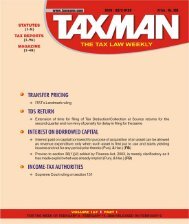CPT V24P7-Art1 (Content).pmd - Taxmann
CPT V24P7-Art1 (Content).pmd - Taxmann
CPT V24P7-Art1 (Content).pmd - Taxmann
Create successful ePaper yourself
Turn your PDF publications into a flip-book with our unique Google optimized e-Paper software.
The Tribunal concluded the decision on the<br />
following grounds:<br />
(a) Admittedly, no allotment was done, but<br />
still, the assessee had specified the number<br />
of shares to be allotted;<br />
(b) Pending the allotment, because few formalities<br />
were to be completed, didn’t merit<br />
the disallowance of said expenditure as<br />
contingent liability;<br />
(c) Merely because there was a lock-in-period<br />
of five years under which if any<br />
employee left before the expiry of five<br />
years, the shares so allotted to him would<br />
vest with the assessee company, didn’t<br />
make the liability as contingent; and<br />
(d) The case of Ranbaxy Laboratories Ltd. v.<br />
ACIT [2010] 39 SOT 17 (Delhi) is to be<br />
differed as in that case the issue was<br />
allowance of notional value of shares which<br />
is at variance with the facts of this case.<br />
Therefore, the claim of assessee stood allowed.<br />
ESOP expenses to be allowed if recognised<br />
in compliance of SEBI norms<br />
In CIT v. PVP Ventures Ltd. [2012] 23<br />
taxmann.com 286 (Madras), assessee had debited<br />
a sum of ` 66.82 lakhs in respect of Employees<br />
Staff Option Plan. The shares were allotted by<br />
the assessee in compliance of SEBI regulations,<br />
which mandate that the difference between<br />
the market prices of shares and the price at<br />
which the option is exercised by the employees<br />
is to be debited to the Profit and Loss Account<br />
as expenditure. During assessment proceedings,<br />
AO allowed the ESOP expenses. However, during<br />
proceeding under section 263, CIT disallowed<br />
the same on the ground that the accounting<br />
treatment prescribed by SEBI, nowhere suggests<br />
that it was revenue expenditure, to be debited<br />
to the profit and loss account, as it was only<br />
a notional and contingent expenditure.<br />
On appeal, the Tribunal held that it was not<br />
a case of contingent liability. The expenditure<br />
}<br />
in this behalf was an ascertained liability, thus<br />
the expenditure incurred being on lines of the<br />
SEBI guidelines, was correctly claimed by the<br />
assessee.<br />
The High Court held in favour of assessee -<br />
It was held that the Tribunal was right in<br />
holding that expenditure in this behalf was an<br />
ascertained liability. Therefore, the High Court<br />
upheld the order of Tribunal and allowed<br />
deduction in respect of difference between market<br />
prices of shares and the price at which the<br />
option was exercised.<br />
Belated return can’t nix section 54F<br />
exemption if investment is made within<br />
specified time limit<br />
In R.K.P. Elayarajan v. Dy. CIT [2012] 23<br />
taxmann.com 206 (Chennai - Trib.), the assessee<br />
derived long-term capital gains on sale of shares.<br />
It filed its return of income on 9-1-2009 claiming<br />
deduction under section 54F in respect of<br />
acquisition of a residential flat. AO denied the<br />
deduction under section 54F on the ground<br />
that due date for filing of return of income<br />
in case of assessee was 31-7-2008 and the sale<br />
deed for transfer of residential property was<br />
executed on 19-9-2008, which was after the<br />
due date for filing of return. On appeal, CIT(A)<br />
allowed the deduction in respect of amount<br />
paid at the time of entering into agreement<br />
‘which was before the due date of filing of<br />
return’ and upheld the disallowance for balance<br />
amount.<br />
The Tribunal held in favour of assessee - It<br />
was held that deduction under section 54F<br />
should be allowed to assessee on following<br />
grounds:<br />
(a) Amount was utilized by assessee for<br />
purchase of new residential flat before<br />
date of filing of return;<br />
(b) Merely because investment is made after<br />
due date of filing of return as specified<br />
under section 139(1), section 54F exemption<br />
cannot be denied; and<br />
August 1 to 15, 2012 u TAXMANN’S CORPORATE PROFESSIONALS TODAY u Vol. 24 u 65<br />
}<br />
685











![“FORM NO. 3CEB [See rule 10E] Report from an ... - Taxmann](https://img.yumpu.com/45480232/1/190x245/form-no-3ceb-see-rule-10e-report-from-an-taxmann.jpg?quality=85)





